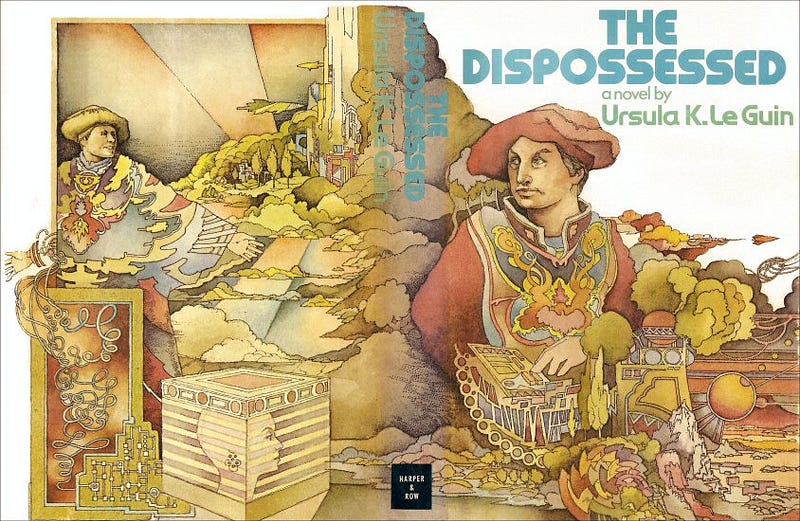
I first came across Ursula K. Le Guin when I read The Ones Who Walk Away from Omelas in an 11th grade English class (which I loved and has always stuck with me).
Over the years, I’ve seen lots of references to her essays and read those: The Carrier Bag Theory of Fiction, the introduction to the Left Hand of Darkness, etc.
The Dispossessed explores different modes of organization civilization, specifically teasing out the second order effects, cultural mores, and failure modes of a capitalist state and communist state.
Some interesting bits…
This reminded me of something I heard Bootes Riley say in a talk (“it’s not enough to just go open a co-op cafe or live in a commune — you need to work on fundamental structural change if you care about this stuff.”):
He had no answer. He had no right to all the grace and bounty of this world, earned and maintained by the work, the devotion, the faithfulness of its people. Paradise is for those who make Paradise. He did not belong. He was a frontiersman, one of a breed who had denied their past, their history. The Settlers of Anarres had turned their backs on the Old World and its past, opted for the future only. But as surely as the future becomes the past, the past becomes the future. To deny is not to achieve. The Odonians who left Urras had been wrong, wrong in their desperate courage, to deny their history, to forgo the possibility of return. The explorer who will not come back or send back his ships to tell his tale is not an explorer, only an adventurer, and his sons are born in exile.
In the communist state, instead of relying on money or police force to drive individual behavior, they rely on custom, culture, and public opinion as a form of authority and coercion. Acknowledging this tradeoff / shift, for me, was one of the most interesting ideas in the book:
“We know that nominally there’s no government on Anarres. However, obviously there’s administration. And we gather that the group that sent you, your Syndicate, is a kind of faction; perhaps a revolutionary faction.”
“Everybody on Anarres is a revolutionary, Oiie. . . . The network of administration and management is called PDC, Production and Distribution Coordination. They are a coordinating system for all syndicates, federatives, and individuals who do productive work. They do not govern persons; they administer production. They have no authority either to support me or to prevent me. They can only tell us the public opinion of us — where we stand in the social conscience. That’s what you want to know? Well, my friends and I are mostly disapproved of. Most people on Anarres don’t want to learn about Urras. They fear it and want nothing to do with the propertarians. I am sorry if I am rude! It is the same here, with some people, is it not? The contempt, the fear, the tribalism. Well, so I came to begin to change that.”
I’ve been reading a lot of fairly academic political / economic theory, so it was really interesting to take a break and read some fiction exploring many of the same ideas, but in a more drawn out thought experiment that gets down into the cultural and individual psychological repercussions implied by broader political / economic structural change.
Another sci-fi treatment on the related topic of automation and labor politics that comes to mind / is worth mentioning is Kurt Vonnegut’s Player Piano. And for a modern take on the same issues in film format: Bootes Riley’s Sorry to Bother You.